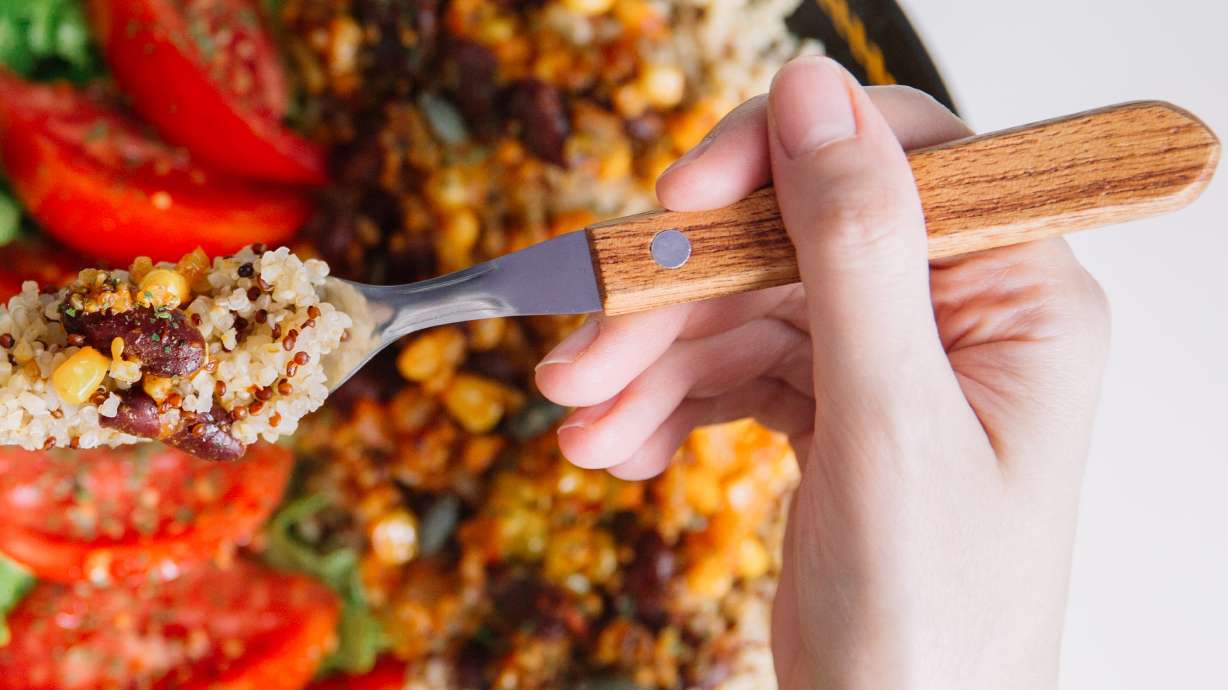Estimated read time: 4-5 minutes
This archived news story is available only for your personal, non-commercial use. Information in the story may be outdated or superseded by additional information. Reading or replaying the story in its archived form does not constitute a republication of the story.
SALT LAKE CITY — The benefits of a plant-based diet are touted in studies, headlines, documentaries and across social media. But what does it actually mean?
Is a plant-based diet strictly eating only plants or can you include animal products in your diet, as well? Here's what some nutrition experts had to say on the topic and how they approach a plant-based diet.
Is following a plant-based diet the same as being a vegan?
Amy Gorin, a registered dietitian in the New York City area considers herself a plant-based dietitian.
"I don't believe that following a plant-based diet means you must be a full-fledged vegan. Rather, it simply means eating more plants at most of your eating occasions," she said. "You can be a vegan, vegetarian, pescatarian, or flexitarian to do so."
Eating more plants doesn’t have to be bland either. Gorin shares many flavorful plant-based recipes on her website, including a vegetarian chopped salad recipe with hard-boiled eggs, vegan peanut butter cookies, and a vegan wild blueberry cauliflower smoothie.
Defining plant-based eating by its name
Though it can sometimes bring up controversy, registered dietitian Kelly Jones is a big promoter of "plant-based" eating. She explains it can easily be defined by its name — as a diet based in plants.
"It does not mean a diet of exclusively plants, as we already have a well-accepted term for that: vegan," Jones said. "Vegan diets may also be referred to as plant-based, however, individuals who sometimes eat red meat can follow a plant-based eating pattern, too."
Portion size and frequency matter
Jones recommends a plant-based diet that emphasizes whole plant foods as the star of most meals and snacks.
"It may or may not include animal products, but the frequency of animal product consumption, and the portion sizes of animal products, are smaller than most conventional American diets," she explained.
Registered dietitian Judy Barbe prefers to use the term "plant-forward." She said out that most people already know they need to eat more vegetables, they just need help doing it.
Because of this, she includes more fruits and vegetables in her recipes to show people how to incorporate more produce quickly and deliciously. Some of her recipes have lean animal protein, like this Vietnamese Beef Noodle Bowl, and some plant-based protein, like this Mediterranean Power Bowl.
Related story:
Instead of telling her students what they can’t eat, Barbe helps them visualize what they can eat. For example, a 3-ounce portion of lean meat looks like a deck of cards, and including that portion with more vegetables overall really clicks with people.
"A salad with steak strips is a good example of how this might look," she said.
Barbe recalled talking to one of her students about what it mean to eat a plant-forward diet.
"One student, who loves beef, was certain I was going to tell him he couldn’t eat it. Instead, we talked about portion size and frequency and he was thrilled to know he could still enjoy it."
Building plant-based meals at home
Registered dietitian nutritionist Leanne Ray recommends building your meals around plant foods, like vegetables, fruits, legumes, nuts or whole grains and using animal products as a flavor enhancer instead of the main component.
"I often halve the amount of meat in a recipe and bulk it up with beans, mushrooms or nuts to add more fiber and vegetables," Ray said. "This helps make plant-forward meals more approachable to most people cooking at home."
Here are some recipes that are an example of building more plant-forward meals at home:
- Instant Pot Chicken Stew
- Shrimp Summer Rolls with Spicy Peanut Sauce
- Prosciutto Wrapped Peaches with Basil & Bleu Cheese
You can also find more recipes from registered dietitians to help include more plants in your diet on Jones' website.
Editor’s Note: Anything in this article is for informational purposes only. The content is not intended, nor should it be interpreted, to be a substitute for professional medical advice, diagnosis, or treatment. Always seek the advice of your physician or other qualified health provider with any questions you may have regarding a medical condition; Any opinions, statements, services, offers, or other information or content expressed or made available are those of the respective author(s) or distributor(s) and not of KSL. KSL does not endorse nor is it responsible for the accuracy or reliability of any opinion, information, or statement made in this article. KSL expressly disclaims all liability in respect to actions taken or not taken based on the content of this article.










